N.B. COVID-19 roundup: There could be a 2nd wave of virus, top doctor warns
Out of 118 confirmed cases of COVID-19 in New Brunswick, 114 people have recovered
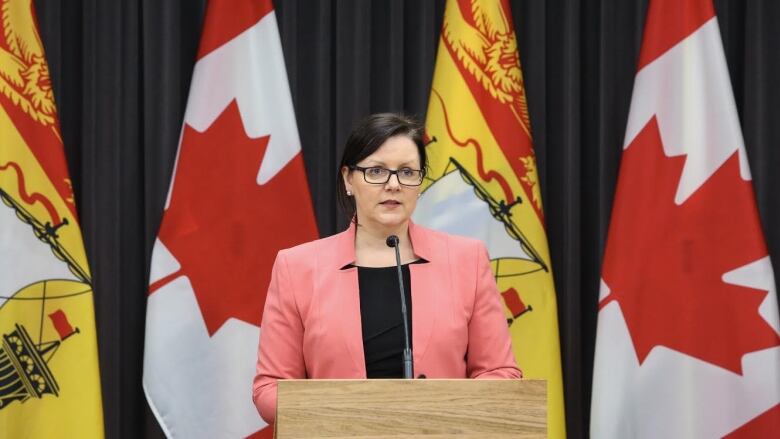
Latest
- Hundreds of calls into 811 line after government expands testing protocols
- Province advises businesses on how reopen
- Farmers angry about ban on temporary foreign workers
- Close to 600 daycares plan to reopen
- Campobello Island ferry set to reopen at the end of June
- Researchers in Moncton hope to develop simpler COVID-19 testing
- What to do if you have symptoms
It's been almost two weeks since a case of COVID-19 has been announced, but that doesn't mean New Brunswick is off the hook.
As long as provincial borders are open for essential travel, the province is still at risk of new cases of the respiratory illness, New Brunswick's chief medical officer of health said Wednesday.
"As long as there are cases globally, as long as there are cases outside our province and just outsidethe province in other jurisdictions, we have to remain vigilant," Dr. Jennifer Russell said.
"COVID-19 is not gone just because we have zero cases in the province today."
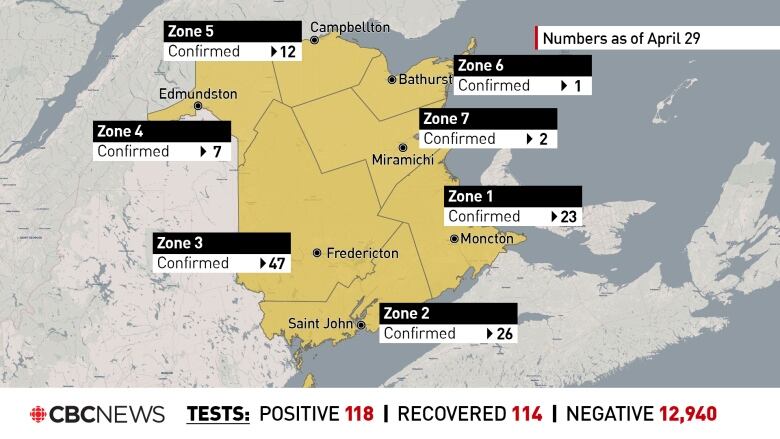
Russell expects a second wave of the virus in New Brunswickrelated to travel or even community transmission.
She noted New Brunswick has borderswithQuebec, Nova Scotia and the United States, which are continuing to see cases of COVID-19.
"Nobody is immune of having new cases of the virus pop up at this stage."
To date, 114 people have recovered from the illness out of the118 confirmed cases. One person is still in hospital.
Here's a roundup of other developments.
Hundreds of calls into 811 line after government expands testing protocols
Earlier this week, theprovince announced it wasexpanding testing protocols for COVID-19to capture a wider range of symptoms of the illness.
On Tuesday there were301 calls toTele-Care 811. Of those calls, there were 152 referrals to the COVID-19 assessment centre.
The additional symptoms are:
- a new onset of fatigue.
- a new onset of muscle pain.
- diarrhea.
- loss of sense of taste or loss of sense of smell.
- In children,purple markings on the fingers or toes.
In thelast 24 hours, more than 260 tests were performed in New Brunswick.
Province advisesbusinesses on how to reopen
Premier Blaine Higgs says he believes many New Brunswick businesses closed by the pandemic will come back stronger, but some won't come back at all.
"Likely not all businesses will restart," Higgs said during his daily news briefing on the coronavirus.
Other businesses will come back "differently," he said, citing those that havegained experience during the outbreak with employees working at home.
Businesses not deemed essential were ordered to close March 19, when New Brunswick declared a state of emergency to control the spread of COVID-19. The province has loosened some restrictions and is headed toward allowing certain categories of businesses to reopen at different stages of recovery.
Businesses that might be allowed to reopen inweeks and months ahead are looking at waysto adjust their operations toconduct business safely.
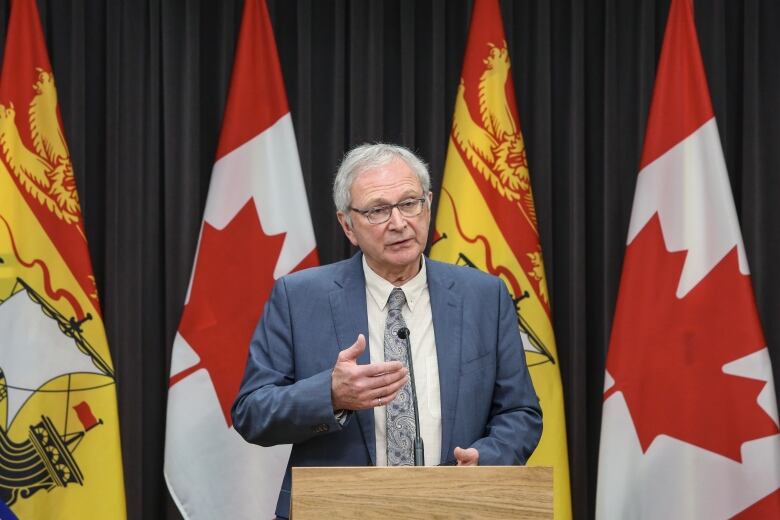
"Each sector is going to have unique needs and requirements that will involve planning and activating new operational requirements," saidHiggs.
He said engagement sessions with specific sectors are being developed. These sessions will allow business owners to hear directly from officials at Public Health, WorkSafeNB and other relevant government departments.
On May 8, Opportunities NB will also providea webinar about economic recovery. The webinar will feature an expert panel that will provide tips and answers to common questions businesses might have to prepare for reopening.
Higgssaid the pandemic is constantly evolving, and New Brunswickers need to adjust their behaviour as needed.
"We may be able to loosen restrictions on one type of business or activity included in a certain stage while still restricting other activities that are part of the same level," he said.
The province is alsoencouraging businesses toreview theGuidance Document of General Public Health Measuresduring COVID-19 Recovery, which includes pre-screening tools, signage templates and other information.
Farmers disappointed over ban on temporary foreign workers
With 70,000 unemployed New Brunswickers and students in the province, Premier BlaineHiggs said at Wednesday's news conference thatit should be possible to fill the approximately 600 farm and fish plant vacancies.
"I am counting on and confident of the many people that are going to come to the plate here and say, 'I can help my local farmer, I can help mylocal fish processor, I can be part of the solution,'" Higgs said Wednesday when he faced questions about his decision to ban temporary foreign workers from the province.
Farmers are expressing anger and disappointment thatforeign workers will be denied entry to help with crops, work some of them have been doing for years.
Higgs announced the ban Tuesday as a measure to help prevent the spread of COVID-19.
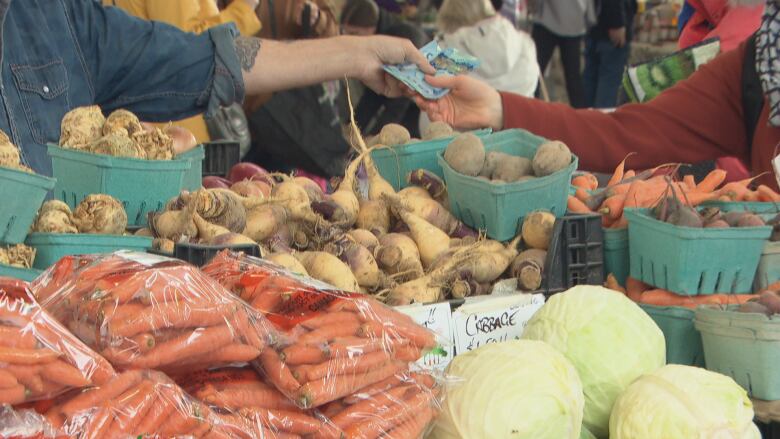
"There is no one more aware of the implications of bringing someone to New Brunswick than the families who are providing the accommodation and the workplace," Lisa Ashworth,president of the Agricultural Alliance of New Brunswick, said Wednesday.
Last week, the provincial government released a 15-document listing protocols for employers to follow if they rely on temporary foreign workers.
Ashworth said farmers were prepared to follow those guidelines, which include allowing foreign workers to isolate for 14-days upon arrival in Canada.
Ashworth saidmany Canadians don't apply for the labour-intensive jobs and even if they did, it's difficult to provide safe training for new workers during a pandemic.
"These are skilled agricultural labourers coming from other countries," she said. "They've been doing this job their entire lives, so they hit the ground ready to be efficient and productive.
"You can't really replace that with someone who's had a successful career in some other industry."
Ashworth said farmers were blindsided by Higgs'sdecision.
And without temporary workers, producers will be forced to plant fewer crops this year.
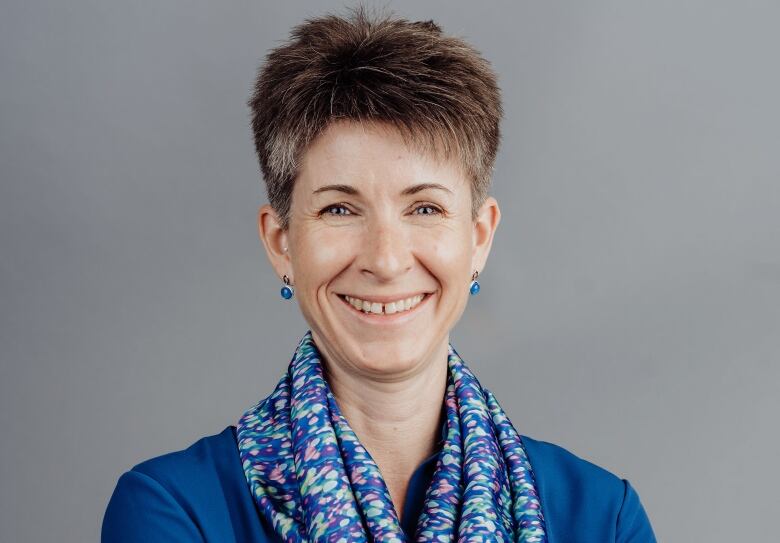
"We have producers who simply say, 'I can't do this. I have to stop spending money because I have no guarantee that I will harvest and sell a crop to recover, even a portion of the losses that I've incurred.'"
Ashworthsaid sheunderstands governmentmade the decision to prevent more cases of COVID-19 in New Brunswick.
But the province also needs a food supply.
"Without food, we don't need to worry too much about health."
Close to 600 daycares plan to reopen
Premier Blaine Higgswas optimisticdaycareswill start to reopen soon, especially with the "willingness" from operators to "step up."
There are more than 800 daycares in New Brunswick, and close to 600 have said they want to start running again, Higgs said.
"We're seeing a great connection there with others to actually help businesses get up who are going to need daycare service," he said.
DaycaresacrossNew Brunswickhave been closed to everyone but children ofessential workers.
The province closeddaycares on March 16 to help curb the spread of the novel coronavirus.
CampobelloIsland ferry set to reopen at the end of June
Premier Blaine Higgs announced Wednesday that the CampobelloIsland ferry is scheduled to open on June 29.
But he said the province is looking at options to move the opening date forward.
Campobello Island, in the Bay of Fundy off the province's southwestern coast, is now only accessiblevia a bridge from Maine more than an hour's drive from the border at St. Stephen.
Researchers in Monctonhope to developsimpler COVID-19 testing
Moncton'sAtlantic Cancer Research Institute,a non-profit research organization at the Dr. Georges-L.-Dumont University Hospital Centre, is trying to find an easier way to test for COVID-19.
Currently, patients receive a swab deep in their nasal passage to test for COVID-19.
But the research institute is hoping to develop a mouth swab test instead, said Dr. Rodney Ouellette, president and scientific director at ACRI.
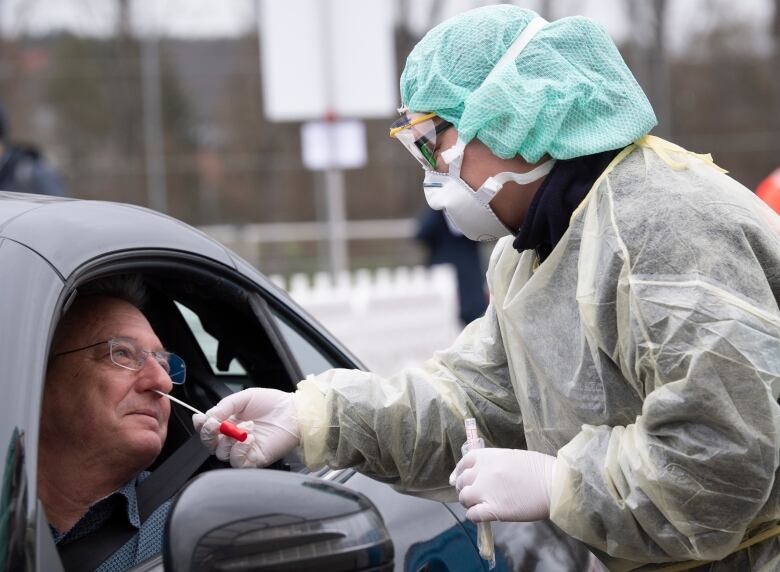
"The problem with a nasal swab is it's invasive and you need somebody to take the swab," he said.
Since the mouth swab could be self-administered, it would eliminate the need for a health professional to put themselves in direct contact with someone who could be infected to orchestrate the test.
"You could do that at home quite, quite easily and then it could be sent in for analysis."
Another team of researchers at the facility ishoping to study how the virus affects people differently. They'll be doing this by taking blood samples, which could help determine who is a high-risk patient.
"We hope that by taking a small blood sample from patients, we should be able to start seeing which patients have a hyperactive immune system."
The Moncton facility has applied for federal and provincialfunding for the two projects. Although they have yet to get approval, Ouellete said the mouth swab testscould be ready for use withina month if the fundingbecomes available.
What to do if you have symptoms
People concerned they might haveCOVID-19 cantake a self-assessmenton the government website. Symptoms include fever,a new or worseningcough, breathlessness, sore throat, headache andrunny nose.
More symptoms were added to the list this week, including: a new onset of fatigue, a new onset of muscle pain, diarrhea, and loss of sense of taste or loss of sense of smell. In children,purple markings on the fingers or toes are also a symptom.
If you have two of these symptoms, you should:
-
Stay at home.
-
Call Tele-Care 811 or your doctor
-
Describe your symptoms and travel history.
-
Follow instructions.
With files from Sarah Morin













_(720p).jpg)


 OFFICIAL HD MUSIC VIDEO.jpg)
.jpg)



























































































